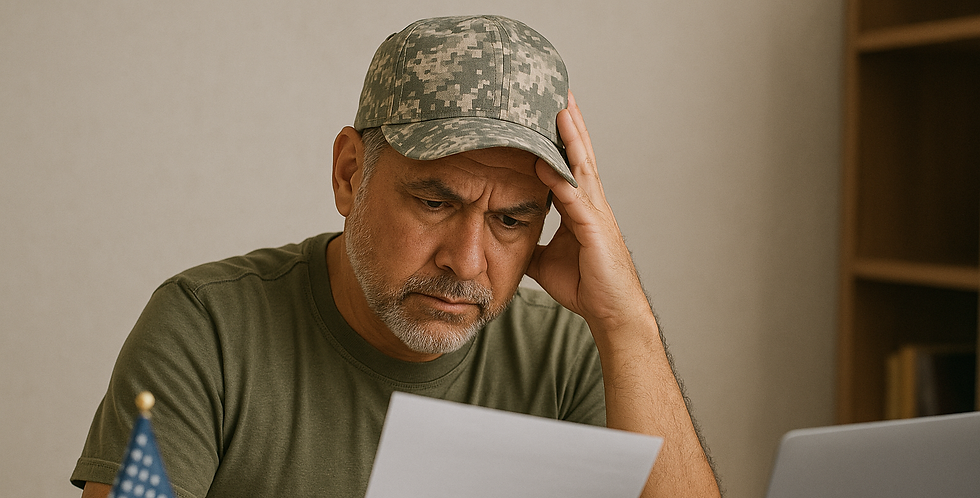Appealing a VA Disability Denial: What Every Veteran Should Know
- Justin Naughton
- May 26
- 3 min read
Updated: Jul 16
How Congruence Law Helps Veterans Navigate the VA Appeals System for the Benefits They Earned
After serving our country, many veterans return home with physical injuries, psychological trauma, or chronic health conditions that affect their daily lives. The Department of Veterans Affairs (VA) offers disability compensation for service-connected conditions—but all too often, veterans find their claims denied, underrated, or delayed. The appeals process is complex, and without strategic guidance, many veterans are left without the support they need and deserve.
At Congruence Law, we help veterans challenge unfair decisions and pursue full, just compensation for service-related disabilities. We guide clients through every level of appeal, from the Regional Office to the U.S. Court of Appeals for Veterans Claims (CAVC), combining precision with persistence every step of the way.
What Is a VA Disability Compensation Appeal?
A VA disability appeal is the legal process used to challenge a denial, partial grant, or low disability rating issued by the VA. Veterans can appeal decisions related to:
Service connection denials
Disability rating percentages (e.g., 10% instead of 70%)
Effective dates of benefits
Termination or reduction of existing benefits
Importantly, the appeals system changed in 2019 under the Appeals Modernization Act (AMA), creating multiple paths for veterans to choose from depending on their claim’s circumstances.
Stages of the VA Appeals Process
1. Supplemental Claim or Higher-Level Review (Regional Office)
Following a denial, veterans may choose to:
File a Supplemental Claim with new and relevant evidence
Request a Higher-Level Review by a senior VA adjudicator without new evidenceThese options remain within the VA Regional Office but provide a way to challenge errors or bring forward stronger documentation.
2. Board of Veterans’ Appeals (BVA)
If the claim is still denied, veterans can appeal directly to the BVA, an independent body that reviews cases and holds optional hearings. Claimants may:
Submit additional evidence
Request a hearing with a Veterans Law Judge
Choose direct review if no new evidence is needed
Board decisions are binding and come with detailed legal reasoning.
3. U.S. Court of Appeals for Veterans Claims (CAVC)
If the BVA denies the appeal, the veteran can take the case to the CAVC, a federal court independent of the VA. The Court reviews:
Legal errors made by the Board
Violations of due process
Inadequate reasoning or failure to consider favorable evidence
CAVC appeals require a licensed attorney admitted to practice before the Court. This is where strong legal advocacy is most critical.
Our Approach at Congruence Law
Veterans’ claims are more than case numbers—they are life stories interrupted by injury, illness, and frustration with a system that too often fails those it was built to serve. Our firm brings a focused, veteran-centered approach to each appeal:
Detailed Record Review. We scrutinize VA decisions, C-files, medical records, service treatment documentation, and prior rulings to identify the weaknesses and missed opportunities in your claim.
Strategic Case Building. We obtain nexus letters, independent medical opinions, lay statements, and updated medical evaluations to strengthen your position.
Procedural Precision. We meet every filing deadline, choose the right appeal lane, and present evidence and argument in the most compelling way for each forum—RO, BVA, or CAVC.
Client Partnership. We explain each step of the process, ensure your voice is heard, and provide clarity in a system often clouded by bureaucracy.
Common Pitfalls Veterans Should Avoid
Failing to Appeal Within the Deadline. Veterans usually have one year from the date of the VA decision to initiate an appeal. Waiting too long may mean starting over.
Relying Only on the Original Records. Many appeals fail because they lack new, relevant evidence—particularly medical opinions or service linkage documentation.
Choosing the Wrong Appeal Path. Selecting the best option—supplemental claim, higher-level review, or direct BVA appeal—requires strategy. We help assess which route offers the best chance of success.
Underestimating the Importance of Legal Representation. Especially at the BVA and CAVC levels, professional advocacy can make the difference between continued denial and successful reversal or remand.
Why Work With Congruence Law
We don’t just navigate the VA system—we challenge it when it falls short of its duty to our veterans. Our legal team brings deep knowledge of veterans law, strong writing and litigation skills, and an unwavering commitment to the individuals we serve.
Whether your disability rating is too low, your condition was denied outright, or your appeal has stalled in red tape, we’re here to fight back with you.
Contact us at veterans@congruencelaw.com to schedule a confidential review of your VA decision. Let’s build the case you deserve—with the dignity and determination your service commands.



Comments